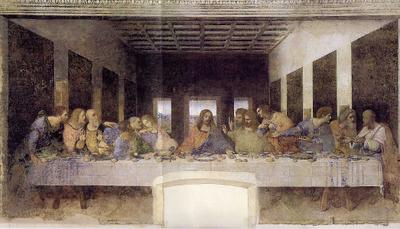The Lord's Supper (Part 2)

In his most recent book, Christ Plays In Ten Thousand Places, Eugene Peterson talks about ritual:
Jesus' most honored command produced a ritual--an ordered arrangement of actions and words that Christians reproduce wherever and whenever they want to "remember" and "proclaim" salvation. A ritual is a way of preserving continuity of action and integrity of language across time and among peoples of various habits and understandings, predispositions and inclinations.
The usefulness of a ritual is that it takes a human action that is understood as essential to our ordinary lives and removes it from our immediate "say-so," protects it from our tinkering and revisions and editing, sets it apart from our moods and dispositions. There is more going on than I am aware of or can be responsible for. Reality is larger than me. A ritual puts me into the larger reality without requiring that I understand it or even "feel" it at the moment.
But there is another useful dimension to a ritual. It keeps us in touch with and preserves mystery. For reality is not only larger than me and my immediate circumstances, it is also beyond my understanding. Rituals preserve mystery, protect certain essential aspects of reality from being reduced to the dimensions of my interest or intelligence or awareness.
A ritual protects common but essential elements of human life from reduction, degradation, exploitation. I cannot take charge of a ritual, I can only enter in--or not. Neither can I engage in a ritual by myself; others are involved. So a ritual, simply as ritual, prevents me from retaining any illusions that I am self-sufficient at the same time that it thrusts me into life with others.
These reflections give texture to our understanding of the Eucharist as the focal practice for living out our salvation. When salvation is received eucharistically with the others who "do this" at the Lord's Table it cannot easily be pursued as a self-project; when salvation is received by eating the bread/flesh and drinking the wine/blood of Jesus, it cannot easily be reduced to a formula or abstraction. "Do this" (poieite, plural) is of necessity and by intention a corporate action.
This ritual, the Lord's Supper, has become an increasingly central part of our worship at Sunnyside Mennonite Church over the last number of years. As we have sought to understand worship in the context of Scripture and the Church, we have been thinking about how our worship is shaped by secular influences--individualism, modernity and it's rational, linear orientation. We are trying to move away from worship as an aggregate of individuals engaging in worship privately (Jesus and me). The central question we should act in worship is not what was my experience, but rather, did I worship God with all my heart, mind and strength.
We are also reorienting ourselves around the Gospel that is proclaimed at the Table, so the preached word, while still important, is not necessarily the "climax" of the worship service. Many congregations in the Mennonite tradition practiced communion two times a year. This was the custom at Sunnyside. Some responded to the shift to more frequent communion with the question--does communion lose some of it's specialness, when we celebrate it more often. I have found that I have grown to appreciate the frecuency of Communion more and more as time has passed. Understanding did not come first. Humility, submission, and obedience did.
As Mennonites, we tend to be very clear about the call to discipleship and our commitment to follow Christ in all of life. As Steve Dintaman has observed, we tend to be less clear on the spiritual roots (resources, practices) that nourish and sustain us and are means of grace. That Jesus can actually come into my life and transform my wandering heart is a miracle of grace, not a consequence of my mind, my will. Not to diminish my part in making room for God, but more and more I see that salvation, transformation, and anything good in my life is a gift of grace, not a product of my own doing.
I am hungry for more and more of the bread of life--Jesus himself.
Blessed are You, Lord God of the universe, our Father for ever and ever; for through Your goodness we have these gifts of bread and wine which earth has given and human hands have made. May they become for us the food and drink of eternal life.
If you are thirsty, drink the Fount of Life. If you are hungry, eat the Bread of Life. Blessed are all who hunger for this Bread and thirst for this Fount.
-Communion liturgy from Celtic Daily Prayer


0 Comments:
Post a Comment
Subscribe to Post Comments [Atom]
<< Home